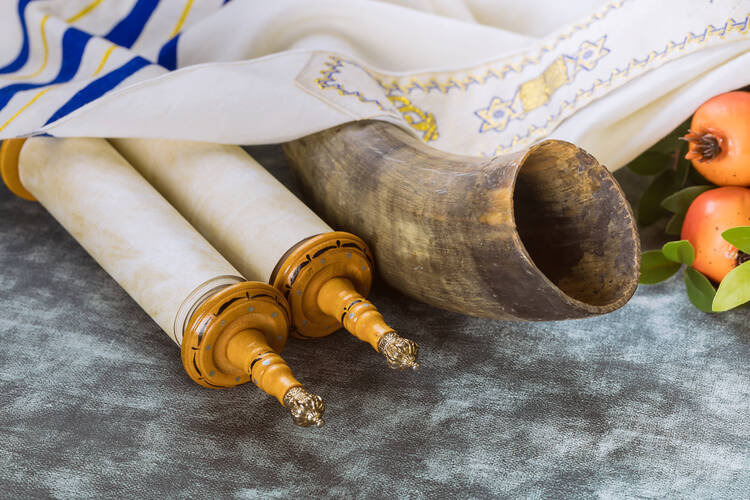Editor's note: This article was first published in America on Oct. 10, 2005.
From the evening of Oct. 3 (the beginning of Rosh Hashanah, the Jewish New Year) till dark on Oct. 13 (the end of Yom Kippur, the Day of Atonement), Jews around the world have been engaged in an intense annual period of repentance. This year—perhaps every year—American society ought to join us in this spiritual process. The Jewish concept of sin (Hebrew: cheyt) derives from the biblical idea of original blessing: God saw the world (including human beings) and Behold, it was very good. So how could there be sin?
The word cheyt derives from archery; it refers to an arrow going astray and missing the mark. Our fundamental inclination and orientation is toward the good; but in the course of our movement toward the target of manifesting God’s image in the world, we go astray; we miss the mark. So the days of repentance and Yom Kippur in particular, the Day of Atonement, are mid-course adjustments to get us back onto our deepest path.
In my synagogue, we say it this way in our liturgy: Who are we? We’re light and truth and infinite wisdom, eternal goodness. Yet we’ve abused, we’ve betrayed, we’ve destroyed. By emphasizing the core goodness, we remind ourselves that acknowledging our sins does not mean making ourselves worthless, but only encouraging ourselves to get back to our highest God connection.
Our fundamental inclination and orientation is toward the good; but in the course of our movement toward the target of manifesting God’s image in the world, we go astray; we miss the mark.
This is the kind of wisdom the liberal and progressive forces in the United States need. Too often those who raise critiques go unheard, because so many Americans feel that to listen is to open oneself to a rhetoric that totally demeans without any path to redemption. So let me state right now that we have every right to remain proud of the American people. For over 220 years Americans have fought to expand the original democratic impulse in our system beyond the original property-owning class to which it was first conferred, to overcome slavery, to extend the vote and civil rights to those who did not own property and then to women and to open our gates to people seeking refuge from around the world.
And yet we have sinned. We have acted perversely; we have done wrong; we have done violence; we have practiced deceit; we have transgressed God’s law and human law; we have dealt corruptly; we have gone astray and led others astray.
The language of Yom Kippur is that of collective responsibility. We are in this together, the Jewish liturgy teaches; and we take collective responsibility for what has happened, even though each of us may not have participated personally in every one of the sins we confess. The Torah tells us that when a human being is found dead in the countryside, the elders of the nearest town must make atonement for the sin of murder. The Talmud asks, Is it possible that these honored leaders could have been murderers? And it answers, Perhaps this dead person was hungry and was not fed, homeless and was not given shelter when he came through the city, so its inhabitants bear responsibility for this death.
We co-create our world. If each of us were actively involved in doing all that could be done to change it, the United States would look very different. But we have succumbed to cynicism about what could be accomplished; we have grown realistic and narrowed our activity to what the powerful tell us through the media we can possibly expect and have therefore accommodated ourselves to actively or passively participating in evil.
Imagine how healing it could be for our country were we to acknowledge our sins and then take two other steps that are integral to the process of teshuva (repentance): asking forgiveness from those we have hurt and working out for ourselves the details of how we are going to stop what we have been doing and return to a higher path of righteousness and love.
It is not hard to imagine what our liturgy for an American Yom Kippur might include:
For the sin of rejecting international agreements on the environment to reduce global warming, for being responsible for 25 percent of the emissions that cause global warming, and thus for contributing to the climate changes that have created a new intensity in hurricanes and tsunamis that over the past 12 months have destroyed the lives of so many;
For the sin of being making war in Iraq with the arrogance of an imperial regime;
For the sin of being the richest country in human history but tolerating extremes of poverty both domestically and around the world, and for creating a global economy in which on average 25,000 people die each day from starvation or from curable diseases—some 12 million avoidable deaths a year;
For the sin of not providing free universal health care for all who need it;
For the sin of blaming all Muslims for the few who are violent;
For the sin of having too little compassion or too little respect for our parents or children;
For the sin of withholding love and support;
And for the sin of....
Chances are you can complete this sentence as well as I can.
Imagine how healing it would be if Americans could do this together, and mean it, and resolve to take the steps to stop sinning in these ways. It is a healing our country needs and our people deserve.








